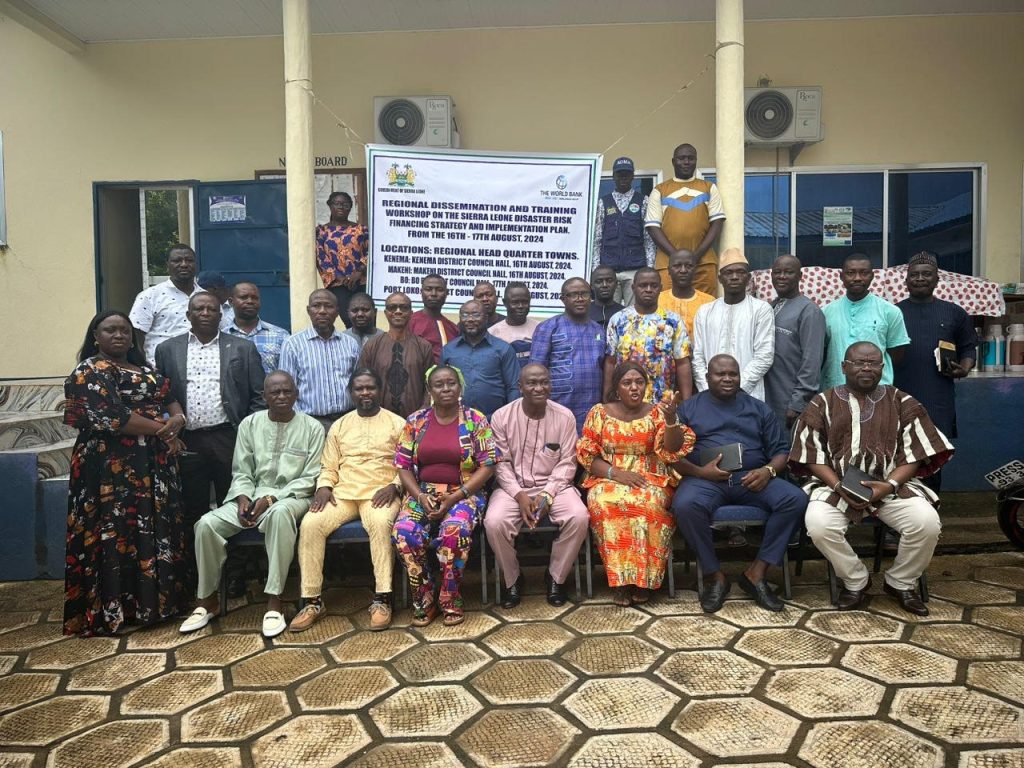Sierra Leone’s Ministry of Finance, in partnership with the National Disaster Management Agency (NDMA) and the National Commission for Social Action (NaCSA), hosted a series of Regional Dissemination Workshops on August 16th and 17th, 2023. These World Bank-sponsored workshops were designed to introduce Sierra Leone’s Disaster Risk Financing Strategy and Implementation Plan to local councils across the country. The workshops were held in four key regional cities: Makeni, Port Loko, Kenema, and Bo, and participants included representatives from various local councils.
The workshop in Kenema gathered council representatives from the Eastern Region, while sessions in Bo, Makeni, and Port Loko served the South, North, and North-West regions, respectively. The initiative is part of a larger effort to provide local governments with the tools and knowledge needed to effectively manage the financial consequences of disasters.
Dr Alhassan Mansaray, Director of the Fiscal Risk Division, was a key figure in the workshops, especially in Makeni and Port Loko, where he elaborated on the strategic priorities outlined in the Disaster Risk Financing Strategy. He emphasized the importance of improving government agencies’ ability to identify and quantify economic losses and financial risks caused by disasters. The strategy aims to improve post-disaster expenditure tracking and fiscal stability at the national and local levels.
Dr Mansaray emphasized the significant financial burden that disasters place on the country, citing previous incidents such as mudslides and floods that caused an estimated US$ 16.8 million in damages and $14.9 million in losses. He stated that the combined annual average loss from flooding in urban areas such as Freetown, Makeni, and Bo amounts to $2.8 million, which is exacerbated by a 2% economic contraction caused by the immediate effects of the COVID-19 pandemic.
He emphasized that when disasters strike, the Ministry of Finance is frequently forced to operate in a constrained fiscal environment, necessitating the diversion of funds that were originally allocated for other essential services. This challenge highlighted the importance of a comprehensive Disaster Risk Financing Strategy to ensure that sufficient resources are available to address disaster-related issues without jeopardizing other critical sectors.
Sinneh Mansaray, an NDMA representative, explained how the agency coordinates and manages national emergencies such as landslides, floods, and fires. He explained that these emergencies are classified into three levels, allowing for a more organized response to different types of disasters. The NDMA has been actively involved in disaster relief efforts throughout the country, collaborating with the Sierra Leone government.
Abdulrahman Kunateh, representing NaCSA, echoed his colleagues’ sentiments, noting that Sierra Leone has faced numerous natural disasters in recent years, causing severe economic damage and disproportionately affecting vulnerable households. He emphasized the government’s commitment to improving social protection systems and implementing cash transfer programs to assist affected communities.
In Bo and Kenema, Joseph Fatoma, Deputy Director of the Fiscal Risk Division, assured local councils that the government now has contingency funds set aside for disaster-related issues. This marks a significant shift from previous practices where funding was primarily sought from international donors during emergencies.
Local council representatives thanked the Ministry of Finance and disaster management agencies for the initiative, promising to collaborate with the government to set aside funds for disaster relief in their respective communities. The workshops covered critical topics such as Disaster Management and Incident Management Systems, Beneficiary Assessment and Mapping, Core Principles of Disaster Risk Finance, Reserve Fund Capitalization, and the designation of district and regional focal persons for the Disaster Risk Financing Strategy.
This strategic initiative by the Ministry of Finance and its partners takes a proactive approach to disaster risk management, ensuring that local councils are better prepared to respond to emergencies and mitigate the financial impact of disasters on their communities.
